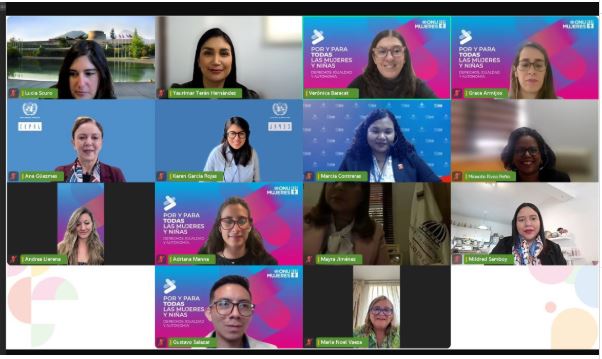Dominican Republic Presents Its First Report on Gender Gaps in Collaboration with ECLAC and UN Women
Work area(s)
The publication “The 2030 Agenda for Sustainable Development and the Regional Gender Agenda in Latin America and the Caribbean: Gender Indicators of the Dominican Republic, 2024” provides an overview of the current progress toward gender equality, based on gender indicators for monitoring the SDGs in the Dominican Republic.

Tuesday, May 27, 2025. In a high-level virtual event, representatives of international organizations and national authorities from the Dominican Republic presented the publication “The 2030 Agenda for Sustainable Development and the Regional Gender Agenda in Latin America and the Caribbean: Gender Indicators of the Dominican Republic, 2024.” The report was jointly prepared by the Economic Commission for Latin America and the Caribbean (ECLAC), UN Women, and the National Statistics Office (ONE). It represents a collaborative effort to strengthen the production and use of gender-sensitive statistics as a basis for the design of public policies aimed at equality.
The event was opened by Ana Güezmes, Director of the Division for Gender Affairs of ECLAC, and María Noel Vaeza, Regional Director of UN Women for the Americas and the Caribbean. Other participants included Miosotis Rivas Peña, then Director-General of ONE; Mayra Jiménez, Minister for Women; Yaurimar Terán, Director of Macroeconomic Analysis at the Ministry of Economy, Planning and Development; Mildred Martínez, new Director-General of ONE; and Julia Sánchez, United Nations Resident Coordinator in the country. The document was presented by Marcia Contreras Tejeda, Head of the Research Division of ONE.
Ana Güezmes, Director of the Division for Gender Affairs of ECLAC, stated that “this publication, the result of joint work with the Government of the Dominican Republic and UN Women, is a key reference tool to strengthen gender-sensitive decision-making, with the aim of accelerating the fulfillment of commitments on the rights of women, adolescents, and girls in all their diversity.” She emphasized that “it provides valuable evidence ahead of the XVI Regional Conference on Women, where countries will promote structural transformations toward equality and the care society.”
The publication “The 2030 Agenda for Sustainable Development and the Regional Gender Agenda in Latin America and the Caribbean: Gender Indicators of the Dominican Republic, 2024” presents an updated overview of progress and challenges in gender equality in the Dominican Republic, based on indicators linked to the Sustainable Development Goals (SDGs) and the Regional Gender Agenda.
Among the key findings, 25.6% of women in the lowest income quintile have no income of their own; one in three women aged 20 to 24 were married or in a union before turning 18; and the maternal mortality ratio in 2023 reached 127 deaths per 100,000 live births, well above the global target of fewer than 70.
The report also reveals that 49.5% of women aged 15 and over experienced food insecurity between 2021 and 2023, 6.8 percentage points higher than men. Likewise, 35.6% of women reported having suffered some form of intimate partner violence in the past 12 months, and 41.8% over the course of their lives. A persistent gap is also reported in unemployment rates (7.9% among women compared to 3.0% among men) and in average hourly earnings, which in 2023 amounted to 128.1 pesos for women compared to 143.5 for men.
The document further identifies that Dominican women devote, on average, more than twice as much time as men to unpaid domestic and care work. For the group aged 25 to 34, this burden reaches 18.2% of daily time, compared to 6.7% for men. This unequal distribution directly affects women economic autonomy, even though the total workload—paid and unpaid—is similar between the sexes.
During the event, recognition was given to the leadership of Miosotis Rivas Peña as Director-General of ONE, from where she chaired the Executive Committee of the Statistical Conference of the Americas during the 2024–2025 biennium. Her leadership in advancing a new generation of women professionals leading national statistical offices was highlighted, particularly through regional initiatives such as the Community of Practice of Women Leaders of National Statistics Offices and the strengthening of gender-sensitive statistical systems from an intersectional, intercultural, and territorial perspective. The event also welcomed the new Director-General of ONE, Mildred Martínez, who previously served as Director of Demographic, Social, and Environmental Statistics at the same institution.
This publication represents the first national version of the regional report presented in April 2025 at the Forum of the Countries of Latin America and the Caribbean on Sustainable Development.